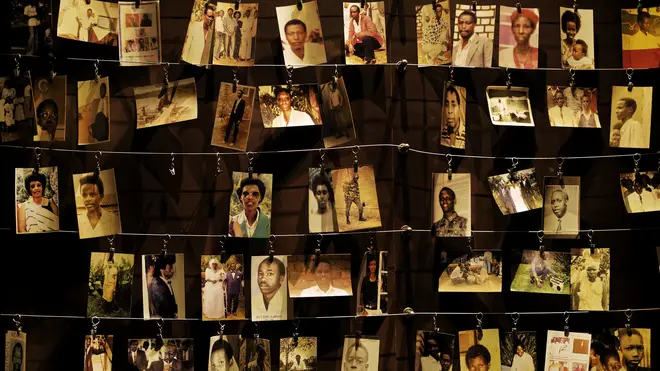
Tonight with Andrew Marr 6pm - 7pm
5 April 2024, 08:54

Rwanda has made it a criminal offence to withhold information about a previously unknown mass grave.
The diggers’ hoes scrape the brown soil, looking for, and often finding, human bone fragments.
The women then wipe the bone pieces with their hands as others watch in solemn silence.
The digging goes on, a scene that has become all too familiar in a verdant area of rural southern Rwanda, where the discovery in October of human remains at the site of a house under construction triggered another search for new mass graves believed to hold victims of the 1994 genocide against Rwanda’s Tutsi.
In the months since, Rwandan authorities say the remains of at least 1,000 people have been found in this farming community in the district of Huye, a surprisingly high number after three decades of government efforts to give genocide victims dignified burials.
As Rwanda prepares to mark the 30th anniversary of the genocide next week, continuing discoveries of mass graves are a stark reminder not only of the country’s determination to reconcile with its grim past but also of the challenges it faces in aiming for lasting peace.

Speaking to The Associated Press, the head of a prominent genocide survivors’ group and several other Rwandans said the discoveries underscore that more needs to be done for true reconciliation.
Rwanda has made it a criminal offence to withhold information about a previously unknown mass grave.
For years perpetrators of the 1994 genocide, including those who served prison terms and were later released, have been urged to speak up and say what they know.
Yet the mass graves are still mostly found by accident, leading to new arrests and traumatising survivors all over again.
The October discovery led to the arrest of Jean Baptiste Hishamunda, 87, and four of his relatives.
After the remains of six people were discovered under his home, diggers started going through his entire property, finding dozens and then hundreds more remains as their search extended to other sites in Huye.

An estimated 800,000 Tutsi were killed by extremist Hutu in massacres that lasted over 100 days in 1994.
Some moderate Hutu who tried to protect members of the Tutsi minority also were targeted.
The genocide was ignited on April 6 when a plane carrying president Juvenal Habyarimana, a member of the majority Hutu, was shot down in the capital Kigali.
The Tutsi were blamed for downing the plane and killing the president. Enraged, gangs of Hutu extremists began killing Tutsi, backed by the army and police.
The government of President Paul Kagame, whose rebel group stopped the genocide and whose party has ruled the East African country since 1994, has tried to bridge ethnic divisions.
The government imposed a tough penal code to punish genocide and outlaw the ideology behind it, and Mr Kagame has fostered a culture of obedience among the country’s 14 million people.
Rwandan ID cards no longer identify a person by ethnicity and lessons about the genocide are part of the curriculum in schools.

Hundreds of community projects, backed by the government or civic groups, focus on uniting Rwandans and, every April, the nation joins hands in sombre commemorations of the genocide anniversary.
Today, serious crimes fuelled by ethnic hatred are rare in the small country where Hutu, Tutsi and Twa live side by side, but signs persist of what authorities say is a genocidal ideology, citing concealing information about undiscovered mass graves as an example.
Then there are incidents of villagers asking mass-grave investigators if they are searching for valuable minerals or dumping dog carcasses at memorial sites, according to Naphtal Ahishakiye, executive secretary of Ibuka, the genocide survivors’ group based in Kigali.
“It’s like saying, ‘What we lost during the genocide are dogs’,” Mr Ahishakiye said.
There are still those who resist coming forward to say what they witnessed, he said. “We still need to improve, to teach, to approach people, up to (when) they become able to tell us what happened.”
As more mass graves are discovered, Tutsi survivors “start to doubt” the good intentions of their Hutu neighbours, he said. Their pleas for information about relatives lost in the killings go unanswered.
In the village of Ngoma, where shacks roofed with corrugated sheets dot lush farmland, diggers come across decaying shoes and pieces of torn clothing among skulls and bones. The survivors are traumatised all over again.
“I have tried very hard to forget,” said Beata Mujawayezu, her voice catching as she recalled the killing of her 12-year-old sister at a roadblock on April 25, 1994.
The girl pleaded for her life with militiamen, going down on her knees in front of a gang leader whom she addressed as “my father”. She was hacked with a machete.
“She was a lovely girl,” Ms Mujawayezu said of her sister as she watched the digging at a mass grave site on a recent afternoon in her Tutsi-dominated neighbourhood.
“One day, hopefully, we will get to know where she was buried.”
Augustine Nsengiyumva, another survivor in Ngoma, said the new mass grave discoveries have left him disappointed in his Hutu neighbours, whom he had grown to trust.
“Imagine sleeping on top of genocide victims,” he said, referring to cases where human remains are found under people’s homes. “These are things I really don’t understand.”
Young people are less troubled by the past. Some Rwandans see this as a chance for reconciliation in a country where every other citizen is under the age of 30.
In the semi-rural area of Gahanga, just outside Kigali, farmer Patrick Hakizimana says he sees a ray of hope in his children that some day Rwanda will have ethnic harmony.
A Hutu and an army corporal during the genocide, Mr Hakizimana was imprisoned from 1996 to 2007 for his alleged role in the killings.
He said he has learnt his lesson and is now trying to win the respect of others in his neighbourhood.
“There are people who still have hatred against Tutsi,” he said. “The genocide was prepared for a long time.”
It will take a long time for people to leave that hatred behind, he said.